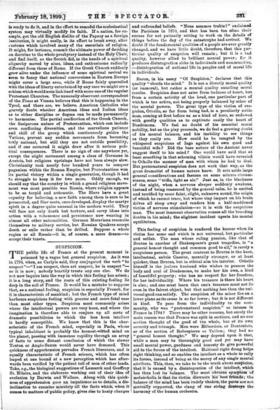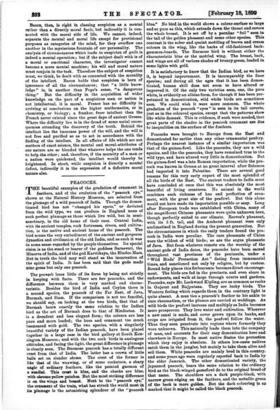SUSPICION.
THE public life of France at the present moment is poisoned by a vague but general suspicion. As it was in 1794, when, as Carlyle said, they conjugated the verb "to suspect"—" I am suspect, thou art suspect, he is suspect "- so it is now; nobody heartily trusts any one else. We do not now inquire into the way in which this feeling has arisen ; it is a long story, and the roots of this existing feeling lie deep in the soil of France. It would be a mistake to suppose that, as a national feeling, suspicion is especially French, for it is characteristic of mankind ; but the French type of mind harbours suspicious feeling with greater and more fatal ease than most other types. Suspicion most commonly arises where the intellectual powers are very keen, and where the imagination is therefore able to conjure up all sorts of dramatic possibilities to which the less keen intellect is hardly susceptible. We know that this is the char- acteristic of the French mind, especially in Paris, whose typical inhabitant is probably the keenest-witted mind on the planet, passing with immense rapidity through an array of facts to some distant conclusion of which the slower Teuton or Anglo-Saxon would never have dreamed. This quickness of apprehension pervades French literature, and is equally characteristic of French science, which has often leaped at one bound at a new perception which has after- wards been verified by the patient toil of men of other lands. Take, e.g., the biological suggestions of Lamarck and Geoffroy St. Hilaire, and the elaborate working out of their idea of evolution by Darwin and Wallace. Along with this quick- ness of apprehension goes an impatience as to details, a dis- inclination to examine minutely all the facts which, when it comes to matters of public policy, gives rise to hasty charges
and unfounded beliefs. "None sommes trabis I" exclaimed the Parisians in 1870, and that has been too often their excuse for not patiently setting to work on the details of things before the day of the catastrophe had arrived. We doubt if the fundamental qualities of a people are ever greatly changed, and we have little doubt, therefore, that this par- Center quality of suspicion will remain ; but it is a bad quality, however allied to brilliant mental power; for it produces disintegration alike in individuals and communities, —disintegration of national life in peoples and of moral life in individuals.
Bacon, in his essay "Of Suspicion," declares that this quality "clouds the mind." It is not a directly moral quality (or immoral), but rather a mental quality entailing moral results. Suspicion does not arise from badness of heart, but from a certain activity of the head, one particular part of which is too active, not being properly balanced by other of the mental powers. The great type of the victim of sus- picion, Othello, so far from being bad, is a peculiarly noble man, coming at first before us as a kind of hero, so endowed with goodly qualities as to captivate easily the heart of Desdemona. We feel no doubt of his essential moral nobility, but as the play proceeds, we do feel a growing doubt of his mental balance, and his inability to see things as they really are. How could he be tempted by the whispered suspicions of Iago against his own good and beautiful wife ? Did the base nature of the Ancient never suggest itself to his mind ? One would have said that at least something in that scheming villain would have revealed to Othello the manner of man with whom he had to deal. But preternatural suspicion does not work that way, as the great dramatist of human nature knew. It sets aside large general considerations and fastens on some minute circum- stance, some "trifle, light as air." Just as, in the blackness of the night, when a nervous sleeper suddenly awakens, instead of being reassured by the general calm, he is excited and terrified by some faint, slight, unknown sound, the origin of which he cannot trace, but whose tiny impact on his brain drives all sleep away and renders him a half-maddened victim of nervous stimulation—so it is with the suspicions man. The most innocent observation rouses all the brooding doubts in his mind; the slightest incident upsets his mental equilibrium.
This feeling of suspicion is rendered the keener when its victim has some end which is not universal, but particular and selfish. The man whose ruling passion, like that of Brutus in another of Shakespeare's great tragedies, is "a general honest thought and common good to all," is rarely a suspicions person. The great contrast to Brutus is the keen, intellectual, subtle Cassius, mentally stronger, or at least quicker, than Brutus, but in ethical aim his inferior. Othello himself is the jealous husband who wishes to possess the body and soul of Desdemona, to make her his own, a kind of beautiful property; who has no respect for her freedom, for her individuality. Where his treasure is there his heart is also; and one must learn that one's treasure must not lie even in the fairest object, but that nothing less than the uni- versal good can satisfy. The suspicion of the miser lies on a lower plane as its cause is so far lower ; but it is not different in kind. To pass from the individuality to the com- munity, why was "preternatural suspicion" so intense in France in 1794? There may be other reasons, but surely the main reason was that France was split in sections, and no one section thought of the good of the whole, but of its own security and triumph. Men were Hebertists, or Dantonists, or of the section of Robespierre or Tallien ; they had no " general honest thought." We may depend upon it that, while a man may be thoroughly good and yet may have small mental power, goodness and honesty do give powerful aid to the forces of the intellect. Habitual right doing helps right thinking, and so enables the intellect as a whole to rally its forces, instead of being at the mercy of any single mental attribute. This, then, we take to be the truth about suspicion, that it is caused by a disintegration of the intellect, which has thus lost its balance. The most obvious symptom of melancholia is that its victim distrusts his best Mends; the balance of the mind has been rudely shaken, the parts are not mutually supported, the clang of one string destroys the harmony of the human orchestra.
Bacon, then, is right in classing suspicion as a mental rather than a directly moral fault, but indirectly it is con- nected with the moral side of life. We cannot, indeed, separate the mental and moral life except for provisional purposes as categories of the mind, for they overflow one another in the mysterious fountain of our personality. The analysis of circumstances which leads to suspicion of guilt is indeed a mental operation; but if the subject dealt with is of a moral or emotional character, the investigator cannot become a mere mental machine; his will and moral nature must conjoin in the task. Therefore the subject of suspicion must, we think, be dealt with as connected with the morality of the intellect. Bacon holds that suspicion is born of ignorance of all the circumstances; that "a little know- ledge" is, in another than Pope's sense, " a dangerous thing." But the difficulty in the acquisition of wider knowledge on the part of a suspicious man or nation is not intellectual, it is moral. France has no difficulty in arriving at conclusions on the higher mathematics, or in chemistry, or biology; a franker, freer intellect than the French never existed since the great days of ancient Greece. Where the difficulty lies is in the dread of some social conse- quences attending the discovery of the truth. Behind the intellect lies the immense power of the will, and the will is not free and purified so as to act in accordance with the finding of the intellect. In all affairs of life which are not matters of exact science, the mental and moral. attributes of our nature are so blended that whatever helps the one tends to help the other; and, therefore, if the morality of a man or a nation were quickened, the intellect would thereby be heightened. In short, while suspicion is directly a mental defect, indirectly it is the expression of a defective moral nature also.







































 Previous page
Previous page